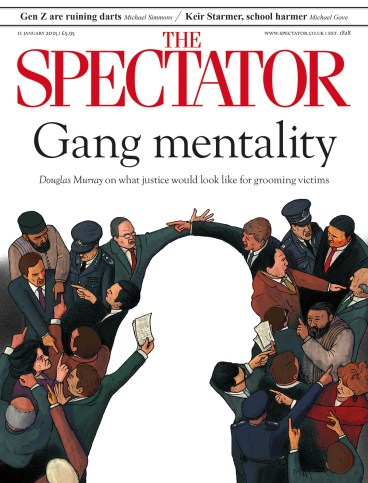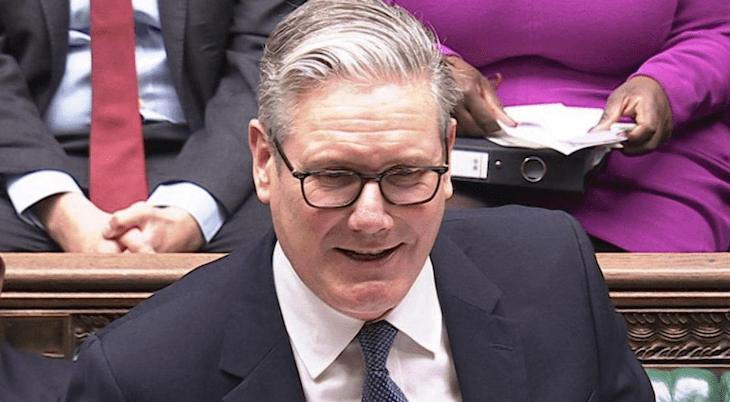
We are nearing the 50th anniversary, next month, of Margaret Thatcher becoming leader of the Conservative party. Only one other woman has ever become leader while the party was in opposition, and that is Kemi Badenoch. Mrs Badenoch is well aware of the strategy her legendary predecessor pursued between becoming leader of the opposition in 1975 and prime minister in 1979, and is sensibly emulating it: a willingness to include rivals in her shadow administration, and to take her time setting out policies (there is, after all, unlikely to be an election before the spring of 2028, by when anything could happen); but to precede the announcement of specific policies by statements of principle, to give a broad idea of what the Conservatives stand for.
She has already made clear, in remarks about mass immigration, the failure to inquire into the apparent impunity enjoyed by the south Asian rape gangs of urban post-industrial Britain, Labour’s poor economic management, flat-rate taxation and her outspoken patriotism, that she is not quite like most of her recent predecessors.
She has long associated herself with the culture wars, and the aim of saving institutions from a drift leftwards
However, things are not as in 1975, and she has a far harder task than Mrs Thatcher did. Her predecessor inherited around 275 Conservative MPs in a House of Commons of 635; Mrs Badenoch has just 121 out of 650. This leaves her with very limited human resources with which to conduct her party’s campaign over the next three or four years. Also, since 1975 her party has acquired an addiction to what might best be called the executive fire: when leaders do badly there are seldom second chances, and they are either shown the writing on the wall and resign swiftly (David Cameron and Rishi Sunak), or are dragged out kicking and screaming after trying to defy gravity (Theresa May, Boris Johnson and Liz Truss). That Mrs Badenoch was, when chosen, the sixth party leader in eight years was a shocking indictment of judgment of the Conservatives all the way from the grass roots to the top of the party. And that the first five leaders were all prime ministers, with a country to run, while trying to contend with endless bickering and a multiplicity of self-inflicted wounds, eloquently explains why the Conservatives were held in such contempt last July, and did so catastrophically.
Her internal opponents and their friends in the media are already restive, but such was the quantity of sour grapes after her victory on 2 November that even had she rapidly doubled the number of Conservative members a small group of them would still be after her. Supporters of James Cleverly and Robert Jenrick made fools of themselves by ‘lending’ votes in the parliamentary contest to other candidates to try to keep Mrs Badenoch out of the final two. Her eventual victory suggests the country is not too deprived of their talents in government.
Mr Cleverly refused to serve in the shadow cabinet and so far has kept quiet; Mr Jenrick is shadow Lord Chancellor and has also maintained discretion; yet it is widely reported that he will do anything to become leader. Whether the party, which has made the odd monumental mistake in recent years, would think it a good idea to choose such a person as its leader is a debate for another time.
A skill Mrs Thatcher and her colleagues had 50 years ago, but which appears entirely absent now except in the leader herself and a few of her close advisers, is patience. One reason for that rapid turnover of leaders is an apparently insatiable desire for the quick fix. Such an attempted fix invariably fails – ask Liz Truss – and the party ends up in a place even worse than square one, because of the additional reputational damage it has acquired en route. This serial incompetence and lack of principle allowed Reform to flourish in the election. It has helped that party build momentum since, and (according to a large poll last month) means it is on course to win around 70 Red Wall seats from Labour at the next election.
The threat from Reform is perhaps the main strategic challenge to the Conservatives in the months ahead. Part of it might evaporate if Reform underperforms in May’s local elections and the Conservatives do well. That would lend credibility to the Conservatives’ claims that they can be a reliable repository for any votes from former Reform supporters, because they have returned to the values that drove people from them to Reform in the first place.
However, it is those values that Mrs Badenoch must start to outline in the next three months, for a local election disaster for her party would give her opportunist internal rivals exactly what they are waiting for.
Mrs Badenoch has long associated herself with the culture wars, and the aim of saving many of our institutions from a compulsory drift leftwards, even under a supposedly Conservative government. Her inspired appointment to the House of Lords of Nigel Biggar, the Oxford theologian hounded and bullied for making the entirely reasonable case that not everything about the British Empire was bad, was like shaking her fist at what these days passes for British academia, with its determination to silence anyone who dissents from the orthodoxy. The mess Labour is making of education due to its doctrinaire curricular views, and its determination to use schools and universities as a main battlefield in the class war, should be a subject for Mrs Badenoch to address in a speech early on, well in time for the local elections.
Whenever she strays on to controversial territory such as migration, her enemies berate her
Indeed, there are similar problems to address throughout a public sector that as well as being overstaffed and inefficient is short on political accountability, and that for years made mincemeat of weak-willed Conservative ministers who allowed the dilution of their policies by officials dreaming of the day when a Labour government would make their job even easier. The public sector cannot go on as it is, not least because much of what is spent on it – or rather wasted in it – will be needed to fund the tax cuts essential to revive the British economy, and to boost dangerously underfunded commitments such as defence. Mrs Badenoch is shortly to announce some policy review groups, and the one on the National Health Service – which Labour, predictably, is finding as hard to run effectively as the last Conservative government did – should include the promise of an audit of every single job in the NHS, which has 1.5 million employees (1.3 million full-time equivalent). Approximately 52 per cent of these are professionally qualified clinical staff; the cuts should come among the 48 per cent who aren’t. Mrs Badenoch needs to start discussing this too, assuring patients that there will be no fewer people to treat them, but that the rest of the manpower will be managed in line with the best private-sector practices. Similar efficiencies need to be brought into local government: one can bet that much of the local election campaign will centre upon infrequent rubbish collections and lethal unmended potholes.
Whenever Mrs Badenoch strays on to controversial territory, such as migration, transgender issues or the size of the welfare state, her enemies in the media berate her and accuse her of gaffes. So certain are they that this refusal to pursue leftist orthodoxy will bring about her downfall that they have even christened her ‘Kemikaze’. Eventually, even some of them will realise that millions of potential Conservative voters have become angry and disillusioned about the failure of supposedly Conservative politicians to talk about the numerous problems of mass migration, an unduly lavish welfare state, institutional leftism in every public service from higher education to the police, the repellence of identity politics, and the attempt to close down debate on these and other ‘difficult’ subjects; and they will realise that she has done herself no harm in having the courage, lacked by too many of her predecessors, to bring them up and fight about them.
She does make mistakes – picking a fight with Nigel Farage over Reform’s membership figures not only gave him and his party vast publicity, but helped further strain relations with a man from whom, come 2028, she might need a serious favour. Yet paradoxically, for all her outspokenness, the very fact that she and Mr Farage have far more in common than they disagree on makes her by far the best person to lead the essential reunification of the right.








Comments